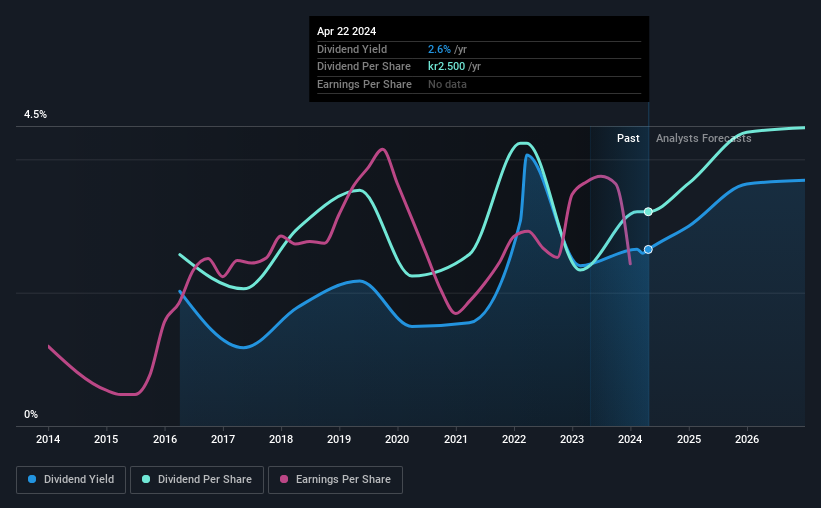Alimak Group (STO:ALIG) Has Announced That It Will Be Increasing Its Dividend To SEK2.50
The board of Alimak Group AB (publ) (STO:ALIG) has announced that it will be paying its dividend of SEK2.50 on the 7th of May, an increased payment from last year's comparable dividend. Based on this payment, the dividend yield for the company will be 2.6%, which is fairly typical for the industry.
View our latest analysis for Alimak Group
Alimak Group's Dividend Is Well Covered By Earnings
We aren't too impressed by dividend yields unless they can be sustained over time. Prior to this announcement, Alimak Group's dividend was comfortably covered by both cash flow and earnings. This means that a large portion of its earnings are being retained to grow the business.
Over the next year, EPS is forecast to expand by 47.7%. Assuming the dividend continues along recent trends, we think the payout ratio could be 36% by next year, which is in a pretty sustainable range.

Alimak Group's Dividend Has Lacked Consistency
Even in its relatively short history, the company has reduced the dividend at least once. If the company cuts once, it definitely isn't argument against the possibility of it cutting in the future. The dividend has gone from an annual total of SEK2.00 in 2016 to the most recent total annual payment of SEK2.50. This implies that the company grew its distributions at a yearly rate of about 2.8% over that duration. We're glad to see the dividend has risen, but with a limited rate of growth and fluctuations in the payments the total shareholder return may be limited.
Dividend Growth May Be Hard To Come By
Given that the dividend has been cut in the past, we need to check if earnings are growing and if that might lead to stronger dividends in the future. In the last five years, Alimak Group's earnings per share has shrunk at approximately 5.2% per annum. Declining earnings will inevitably lead to the company paying a lower dividend in line with lower profits. It's not all bad news though, as the earnings are predicted to rise over the next 12 months - we would just be a bit cautious until this can turn into a longer term trend.
In Summary
Overall, we always like to see the dividend being raised, but we don't think Alimak Group will make a great income stock. The company is generating plenty of cash, which could maintain the dividend for a while, but the track record hasn't been great. Overall, we don't think this company has the makings of a good income stock.
Investors generally tend to favour companies with a consistent, stable dividend policy as opposed to those operating an irregular one. At the same time, there are other factors our readers should be conscious of before pouring capital into a stock. For instance, we've picked out 2 warning signs for Alimak Group that investors should take into consideration. Looking for more high-yielding dividend ideas? Try our collection of strong dividend payers.
New: Manage All Your Stock Portfolios in One Place
We've created the ultimate portfolio companion for stock investors, and it's free.
• Connect an unlimited number of Portfolios and see your total in one currency
• Be alerted to new Warning Signs or Risks via email or mobile
• Track the Fair Value of your stocks
Have feedback on this article? Concerned about the content? Get in touch with us directly. Alternatively, email editorial-team (at) simplywallst.com.
This article by Simply Wall St is general in nature. We provide commentary based on historical data and analyst forecasts only using an unbiased methodology and our articles are not intended to be financial advice. It does not constitute a recommendation to buy or sell any stock, and does not take account of your objectives, or your financial situation. We aim to bring you long-term focused analysis driven by fundamental data. Note that our analysis may not factor in the latest price-sensitive company announcements or qualitative material. Simply Wall St has no position in any stocks mentioned.
About OM:ALIG
Alimak Group
Alimak Group AB (publ) desigs and manufactures vertical access solutions in Europe, Asia, Australia, South and North America, and internationally.
Solid track record with adequate balance sheet.
Market Insights
Community Narratives




